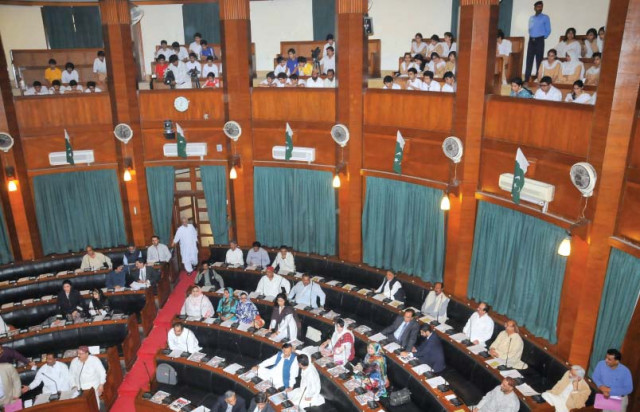Seniority rules: If experience counts, Sindh govt has aplenty
In almost every department, senior posts are held by retired bureaucrats or judges.

File photo of the Sindh Assembly. PHOTO: EXPRESS/FILE
The adage old is gold fits perfectly well with the Sindh government. The provincial bureaucracy is full of aged, retired officials working on top positions.
Soon after the current government took over the reins in 2008, it announced it won’t hire retired government officers and even punish those working on deputation from other departments or were promoted out of turn.
The Sindh government instead continued with the same policy what its predecessors had followed in the past 10 years.
It also started hiring more people in similar fashion and even modified the cadres of employees working in semi-government corporations to civil servants, which is a highly reputable job in provincial secretariat services.
No department was spared: education, excise and taxation, food, health, home, irrigation, local governments, and works and services. Everywhere, senior positions were handed to non-professionals from some other parent department.
The law department takes the cake, where almost all senior posts are occupied by retired bureaucrats and judges. But the law minister thinks who else but a former judge can have a better legal opinion.
“More than 300 officers, working in the provincial bureaucracy, are either retired government servants or have been absorbed [from other departments] in the secretariat group,” a grade 19 officer told The Express Tribune.

In the law department, Ghulam Nabi Shah, a retired bureaucrat, has been working as the secretary for the past four and a half years. Similarly, the additional secretary, Jan Muhammad Kalhoro, and deputy secretaries Altaf Rehman Bughio and Aslam Shaikh are all retired officers.
Some senior, retired bureaucrats have even been appointed as consultants and advisers, according to the Services, General Administration and Coordination Department. Pir Bux Brohi, who retired as an additional secretary in 2005, now works as a legal consultant at the department. After his retirement, Naseer Shaikh, another additional secretary, was posted as an adviser to the law minister.
A retired bureaucrat, Shamsuddin Bhutto, also landed a job as a consultant at the agriculture department while Abdul Hai Dhamraho, a former director of excise and taxation, is still working there as a “technocrat” after his retirement.
Wasim Ahmed, the former Karachi police chief was posted as the director-general of Federal Investigation Agency when he retired. But after the Supreme Court ordered his dismissal, he was appointed as the additional chief secretary of the home department.

“We challenged their appointment in the apex court but the Sindh government promulgated the Sindh Civil Servant (Amendment) Ordinance, 2012, giving legal protection to all its wrongdoings,” a civil servant complained.
“Absorption [of retired officials in secretariat group] is alarming for us,” he said. “Appointing outsiders on senior positions not only affects our seniority but also demoralises the institutions.”
“Can you imagine a lecturer working as a police officer and a headmaster appointed as a grade 17 officer in the local government department? No one can challenge these decisions,” he said referring to the ordinance issued on September 2. The ordinance has, however, lapsed now as the government could not pass it in the Sindh Assembly within 90 days.
“I am a consultant not a Sindh government employee. It is better to ask the high-ups,” Shamsuddin Bhutto, a consultant at agriculture department, retorted when asked about his position.
The Sindh chief secretary and the services secretary were also reluctant to comment on the issue.
But Ghulam Nabi Shah, the law secretary, said,”There is a dearth of senior law experts so the government prefers to appoint retired judges and senior bureaucrats.”
“Whatever was done was according to laws. We appointed the people because of their services and expertise in their field,” Sindh Law Minister Ayaz Soomro told The Express Tribune. “Soon a bill will be passed by the Sindh Assembly to amend the Sindh Civil Servants Act, 1973.”
Published in The Express Tribune, January 28th, 2013.



















COMMENTS
Comments are moderated and generally will be posted if they are on-topic and not abusive.
For more information, please see our Comments FAQ